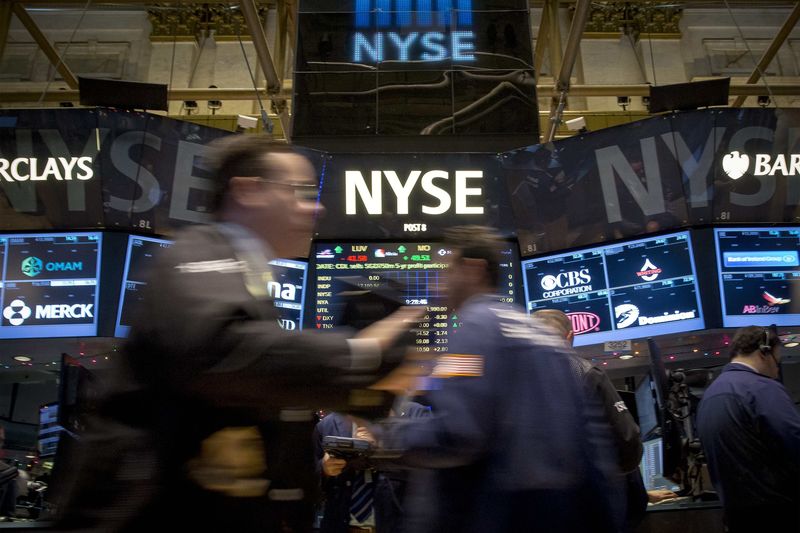By Geoffrey Smith
Investing.com -- Elon Musk crowdsources his financial planning to Twitter and Tesla's (NASDAQ:TSLA) stock falls in response. Joe Biden's infrastructure bill finally passes the House of Representatives, putting selected companies in line for some juicy government contracts. China's export sector is still humming as the Communist Party huddles to enshrine Xi Jinping as President-for-life, and Europe's natural gas prices surge as an expected increase in shipments from Russia fails to materialize. Speeches from Jerome Powell and other Fed officials pepper the economic calendar, meanwhile. Here's what's you need to know in financial markets on Monday, 8th November.
1. Tesla stock slumps as Musk moves to pay tax bill
Tesla stock fell 5.3% in premarket trade after Elon Musk indicated he would sell 10% of his stake in the company. That would create a temporary stock overhang worth some $20 billion.
The move would represent the biggest cash-out yet by the company’s CEO, who last week expressed puzzlement at how violently the stock had risen in response to an announcement of a bulk order from car rental firm Hertz Global (OTC:HTZZ). Musk said himself that no contract had been signed for any such deal yet.
The last leg of the company’s extraordinary rally this year saw it add some $200 billion in market value. The value of the Hertz order would likely be between $4 and $5 billion in sales and considerably less than $1 billion in profit.
Musk framed the poll as a response to the Democrats’ proposal to tax unrealized stock gains. He had previously acknowledged that he will trigger a hefty tax bill in any case by exercising stock options that are his chief source of income.
2. Infrastructure bill finally passes House
The House of Representatives passed an infrastructure spending bill worth around $1 trillion on Friday night, in a desperately-needed boost to President Joe Biden’s fortunes after a week of stinging electoral reverses.
The bill needed the support of a handful of Republican lawmakers to pass, having been snubbed by a similar number of Progressive Democrats.
The bill provides for around $550 billion in extra federal spending on roads, bridges, broadband access and water systems, among other things. It also include provisions for rolling out charging infrastructure for electric vehicles.
3. Stocks set to open higher; Fed speeches eyed
U.S. stocks are set to open higher later, encouraged by the passage of the infrastructure bill that puts a good swath of companies in line for some government largesse in the coming years.
By 6:20 AM ET (1120 GMT), Dow Jones futures were up 74 points, or 0.2%, while S&P 500 futures were up by less than 0.1% and Nasdaq 100 futures were down by 0.1%. The latter two products were suffering from the fall in Tesla stock.
Coty (NYSE:COTY) leads a much-diminished earnings roster early, while PayPal (NASDAQ:PYPL), Tripadvisor and IFF report after the closing bell.
There will also be a slew of Federal Reserve speeches, including one from Federal Reserve Chairman Jerome Powell at 10:30 AM ET.
4. Xi may be the one they can't forget
China’s Communist Party started a meeting that analysts say may clear the path for Xi Jinping to rule as President for the rest of his life, breaking with five decades of precedent.
The plenum, which will take place behind closed doors, brings together some 400 of the party’s top officials, and is scheduled to run through Thursday, is expected to feature a ‘resolution on history’ that will cement Xi’s place at the top.
The meeting typically ushers in a season of political appointments across the country. That may be more volatile than usual, in the light of Xi’s shift in political priorities this year to rein in inequality, and the real estate crisis that has ripples throughout the economy. The country’s export sector, however remains in rude health: data on Sunday showed exports running at 27% ahead of last year’s levels in October.
5. Oil revives on Chinese trade data; Russia leaves Europe gasping for gas again
Crude oil prices regained their mojo over the weekend, supported by China’s trade data and by reports that U.S. President Joe Biden may further tighten restrictions on U.S. oil pipelines, despite pressuring the world’s largest exporters to increase supply last week.
By 6:30 AM ET, U.S. crude futures were up 1.6% at $82.56 a barrel, while Brent futures were up 1.4% at $83.86 a barrel.
However, the main action in energy markets overnight was in Europe, where natural gas futures surged again in response to signs that Russia had not, after all, increased shipments to Europe through its main export pipelines, despite earlier rhetoric from President Vladimir Putin and gas monopoly Gazprom (MCX:GAZP) indicating that it would.
